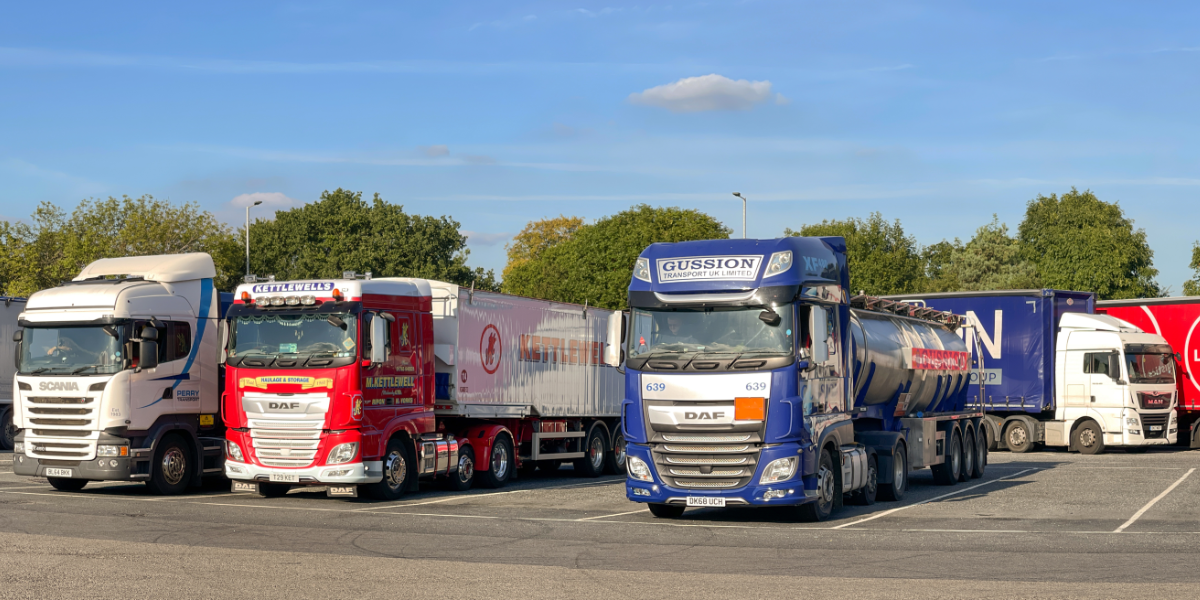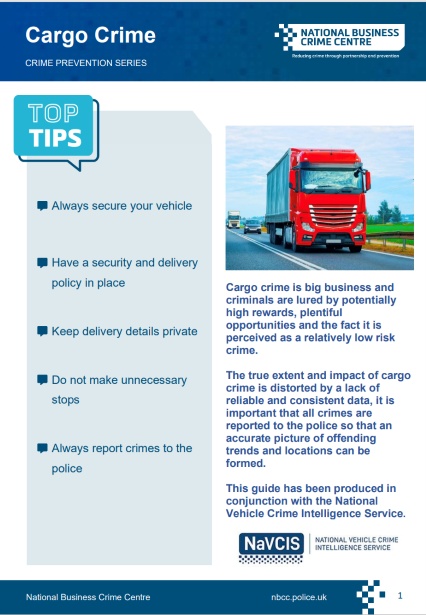
NBCC teams up with NaVCIS on Cargo Crime Prevention
The NBCC, in partnership with the National Vehicle Crime Intelligence Service (NaVCIS), has developed a comprehensive crime prevention guide to help tackle high value thefts targeted at the freight industry.
Cargo crime is big business and criminals are lured by potentially high rewards, plentiful opportunities and the fact it is perceived as a relatively low risk crime.
The estimated cost of cargo crime in the UK is hundreds of millions of pounds each year, but the true extent and impact of cargo crime is distorted by a lack of reliable and consistent data. The most recent data from the NaVCIS reported that in 2020 they received 4468 notifications of HGV, Freight and Cargo crimes.
They also found that the combined cost price value of all cargo crimes during 2020 was £95,704,265.39, but retail values would be at least four times greater.
DCI Brett Mallon. Head of Unit ay NaVCIS said: “The Freight sector is critically important to the economy and everyone in it deserves the support of policing and government to help curb the menace of criminals targeting them.
“Together with the NBCC we have produced this simple guidance to help drivers understand some of the more common risks and what they should do to stay safe, in the event they are caught up in crime.”
“NaVCIS and our partners work to raise awareness of Freight crime and generate action from UK policing and industry - this guidance has practical and pragmatic advice that any driver or haulier can follow.
“No one measure will eliminate freight crime, but this is another important step forward.”
Cargo at rest is cargo at risk
Freight vehicles are at most risk of being targeted at night, whilst parked up. The moment a vehicle stops the risks increase significantly, with 63% of cargo crime occurring when a vehicle is parked (away from a depot or known facility). Nine in every 10 of these incidents are reported to take place in unsecured locations. That means the choice of parking location can significantly reduce or increase the chances of being targeted.
Unfortunately, there are a lack of available truck parking spaces both in the UK and into Europe making it extremely challenging to identify suitable, secure rest areas. It is therefore vital that drivers plan ahead; identifying their route, scheduling rest breaks and deciding in advance where they will stop.
When deciding where to stop, locations that may offer security fencing or CCTV are preferable. Where CCTV is present it’s important to park in sight of the cameras and avoid dark, secluded parking spots.
Drivers can also minimise the risks to their vehicles by parking defensively. Tactics like parking closely to another vehicle or obstacle to prevent the doors from being opened or parking in such a way that protects and blocks access to fuel tanks can act as effective deterrents.
Remember the basics
- Never leave the vehicle unattended with keys in the ignition
- Lock vehicle doors, (including cab doors when inside)
- Never pick up hitchhikers
- Ensure mobile phones are fully charged and have a signal
- Always let someone know where you have parked
- When returning to the lorry, check for signs of any interference
Even taking all possible precautions cargo crime can still happen. If it does then it is essential crimes and credible suspicious incidents are reported to the police. This allows police to capture the evidence of a crime or understand the full scale of the incident which maybe a pre requisite to a crime.
Cargo thefts can also be reported to NaVCIS, who are a national police unit that bridges the gap between policing and industry. They have a dedicated Freight team who work closely with the haulage industry.
The NBCC and NaVCIS have worked in partnership to produce a comprehensive crime prevention guide for the industry – please download a copy of the Cargo Crime here or click the image below:
